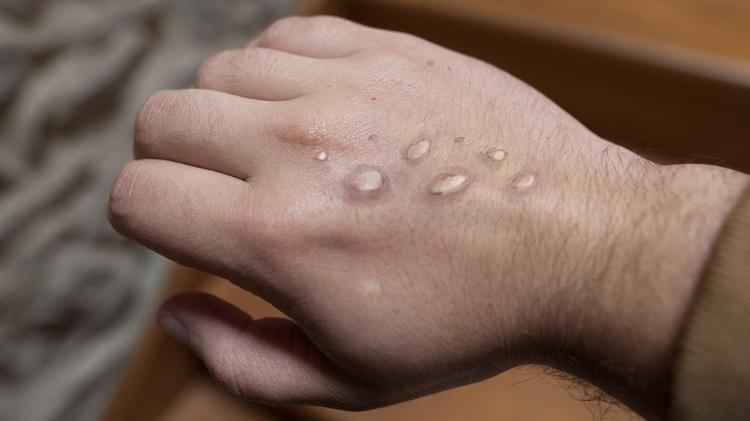Faced with the rapid increase in cases worldwide, the World Health Organization has decided to put on maximum alert for the disease. More than 600 cases have been recorded in Brazil, most of them in São Paulo.
The World Health Organization has declared monkeypox a global health emergency, given the rapid increase in disease cases around the world.
This rating is the highest warning WHO can issue, and the decision was made this Saturday (23), after the second meeting of the organization’s emergency committee on the virus.
The announcement was made by Tedros Adhanom Ghebreyesus, the general secretary of the institution. In practice, the state of emergency forces health institutions around the world to increase preventive measures. So far, 16,000 cases of monkeypox have been reported in 75 countries.
More than 600 cases of the disease have been recorded in Brazil, of which 425 were in São Paulo. There are currently only two other health emergencies of this type: the coronavirus pandemic and ongoing efforts to eradicate polio.
Tedros said the emergency committee was unable to reach a consensus on whether the smallpox epidemic, classified as a global health emergency, should be on high alert.
But he said the epidemic was spreading rapidly around the world and he decided that this was actually an international concern. “WHO’s assessment is that the risk of smallpox is moderate globally and in all regions except Europe, which we consider high risk,” he added.
Preventive measures and vaccines
Tedros said the declaration will help speed up the development of vaccines and implement measures to limit the spread of the virus. This is because health institutions around the world base their decisions on WHO assessments.
The organization is also issuing recommendations and said it hopes they will encourage countries to take steps to stop the transmission of the virus and protect those most at risk.
“This is an epidemic that can be stopped with the right strategies in the right groups,” Tedros said.
what is monkey flower
Monkeypox was first discovered in Central Africa in the 1950s. The virus is transmitted when someone comes into close contact with an infected person. It can enter the body through skin lesions, respiratory system or eyes, nose and mouth.
Symptoms include rash, fever, headache, back or muscle pain, swollen lymph nodes, chills, and fatigue.
Monkeypox is not a disease that spreads that easily, but it can be transmitted in the following ways:
- When touching clothes, sheets and towels used by someone with skin lesions caused by the disease;
- When the blisters or crusts on the skin of people with these lesions are touched;
- From coughing or sneezing by people with monkeypox.
So far, the virus has not been identified as a sexually transmitted infection, but it can be transmitted during sexual intercourse with intimacy between the persons involved.
The most recent cases have been observed in gay or bisexual men in Europe and Brazil. In the UK, the Health Safety Agency (UKHSA) has urged men to watch out for itching or skin sores that seem unusual to them.
Mateo Prochazka, an epidemiologist at the UK Health Safety Agency, stressed, however, that “infections are not related to sexuality”. “We are concerned about smallpox as a general public threat. We are concerned about everyone’s health.”
Animals such as monkeys, mice and squirrels can also become infected and transmit the virus.
After infection, it usually takes 5 to 21 days for the first symptoms to appear. In this process, itching may occur that usually starts on the face and then spreads to other parts of the body, especially the hands and soles of the feet.
Usually quite bothersome and painful, the itch changes and goes through different stages – similar to chickenpox – before forming a crust and then subsides.
Infection usually ends after 14 to 21 days.
In the current outbreak, most infections so far have been mild. However, the disease can have more serious forms, especially in young children, pregnant women and people with sensitive immune systems. There have already been cases of death from the disease in West Africa.
Vaccination is the best way to prevent epidemics: smallpox vaccine can protect against the vast majority of monkey disease cases. The challenge is to find available doses.
vaccine problem
Currently, there are two effective vaccines against monkeypox. One, called Jynneos, is newly manufactured and only approved in the United States and Canada.
The other is the ACAM 2000 vaccine, which is used against traditional smallpox.
But according to professor Carlos Rodriguez-Díaz, both have limited reserves and currently international health organizations and governments are unable to carry out mass vaccinations, leaving the population unprotected.
The New York Times reported in early July that the Danish company that manufactures Jynneos will ship 2 million doses to the US, but not until the end of 2022. And the company only has the capacity to make fewer than five million vaccines. . for the rest of the world.
In Brazil, the Ministry of Health reports that it is considering purchasing vaccines, while Bhutantan is exploring the possibility of producing immunizers in the country.
This report was first https://www.bbc.com/portuguese/geral-62279558
source: Noticias
[author_name]
